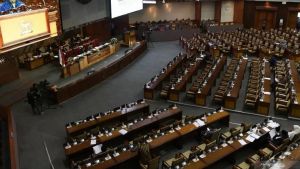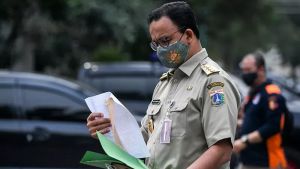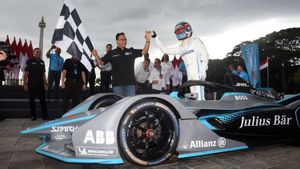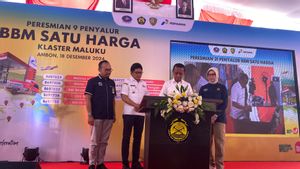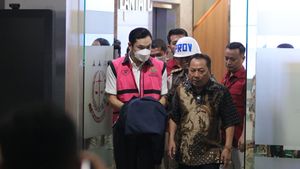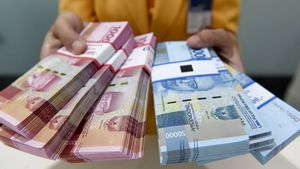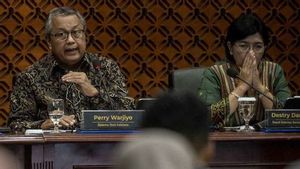JAKARTA - There is no single urban area in Indonesia that is free from waste problems because the increase in the volume of waste is not proportional to the addition of storage areas, both temporary disposal sites (TPS) and final disposal sites (TPA).
The limitations of waste transportation, reluctance to pay waste fees, and bad ethics make residents throw their garbage anywhere they want. Where there is garbage piled up, other residents from day to day join "urunan" throwing garbage in that place.
As a result, illegal garbage piles appear on vacant land, bridges, and public roads. This is easily found in every village and kelurahan close to the city.
Megapolitan areas of Jakarta, Bogor, Depok, and Tangerang (Jabodetabek) with high population growth become areas with a heavy waste management burden.
The limited fleet and officers who carry garbage from residents' homes have made some settlements unserved or deliberately not managing waste so that residents throw their garbage in any place.
In the last two months the Bekasi Regency Civil Service Police Unit closed two illegal polling stations. The first will be on 17 May 2022 in Kobak Rante Village, Karang Reja Village, Pebayuran District, while the second will be on 14 June 2022 in Sindangjaya Village, Branchbungin District.
Bekasi Regency has a Regional Regulation No. 4 of 2012 related to public order where improper waste disposal is threatened with a maximum imprisonment of six months and or a fine of IDR 50 million in accordance with article 46 of the regulation.
Head of the Waste Control and Management Division of the Bekasi Regency Environmental Service, Eddy Sirotim, explained that collecting waste without heeding the processing system as carried out by the manager is not justified.
Moreover, his party is promoting a waste bank program in a number of areas so that waste can be processed so that it has economic value.
The district has a program to empower the community through RT and RW to create a waste bank. Household waste is sorted, processed, and utilized. The residue is disposed of at the Burangkeng TPA, an official TPA.
Overcapacity
Not only the problem of illegal TPS, currently there are a number of official TPAs in Jabodetabek which are already overcapacity, such as the Bantargebang TPA belonging to the DKI Provincial Government, the Burangkeng TPA belonging to the Bekasi Regency, and the Cipayung TPA belonging to the City of Depok.
Based on the Antara report, the pile of garbage at the Bantargebang TPA has reached 50 meters, making it more prone to landslides. Likewise, the Burangkeng and Cipayung landfills, both of which have excess capacity.
TPA Cipayung Depok was actually scheduled to be closed two years ago and moved to TPA Nambo, as a regional TPA. However, it has been postponed until the end of 2022 pending the readiness of the Nambo TPA manager.
As a result, thousands of residents in a radius of one kilometer are restless because when strong winds occur, they will feel the smell of garbage.
Likewise the residents of Burangkeng Village, Setu District. They protested and asked the local government to immediately improve the waste management system at the Burangkeng TPA which has been overcapacity since 2006.
The mountain of garbage is getting higher so that if there is a strong wind, the smell of garbage can spread within a radius of two kilometers.

The head of the Burangkeng Youth Organization, Carsa Hamdani, said that the Burangkeng TPA needs revitalization, while the disposal method must also be improved and not just piled up.
The process of decomposition of waste by natural decomposition will actually increase the height of the mountain unless there is an expansion of the disposal area.
Khaerul Hamid, Head of the Cleanliness Division of the Bekasi Regency Environmental Service, admitted that the condition of the Burangkeng TPA was inadequate, while improvements had actually been proposed. It's just not getting a bright spot.
According to Hamid, the expansion of the Burangkeng TPA is very possible because according to regulations, the Burangkeng TPA is 11.6 hectares in size, while based on the results of measurements from the Environmental Service with the Bekasi Regency BPN, the land used is only around 9.5 hectares.
Deputy Chairman of Commission III of the Bekasi Regency DPRD, Cecep Noer, emphasized that his party supports the Burangkeng TPA expansion plan, it can even be done this year by utilizing the 2022 Revised APBD.
In addition to expansion, road repairs and the construction of dividing walls can also be carried out this year so that garbage does not spill over into residential areas.
It is time for Bekasi Regency to build an integrated waste management system in each region. This change in pattern can significantly reduce waste production so that the waste that is disposed of in the TPA is only a small part of the daily waste production.
Garbage sorting
The problem of the volume of waste can actually be reduced by a program for selecting household waste along with a follow-up program to process segregated waste, both organic and inorganic.
The selection of household waste has been echoed since the New Order era and always appears about every Environment Day commemoration, but its implementation is far in the field.
This is because there is no obligation for every house to sort waste before it is disposed of to the TPS, while there is only an appeal, especially at each TPS there is also no grouping of the waste.
In the midst of a waste management crisis, it is time, especially in urban areas, to make a regional regulation that contains rules that every house is obliged to sort waste. Mandatory submit two bags of organic and inorganic waste to the nearest TPS.
The involvement of PKK and Karang Taruna is important to continue processing organic waste because it can be managed as compost or raw material for worm and maggot cultivation.
The science of worm and maggot cultivation is easy for anyone to follow through the YouTube media, which explains the cultivation process in many ways.
The local government to the village/kelurahan level can assist in the development, provision of seeds, and marketing of compost, worms, and maggots.
It would be even better if Karang Taruna was empowered so that the business of using worms and maggots could be used as fodder for poultry and fish.
VOIR éGALEMENT:
Kascing or used media for worm cultivation into organic fertilizer has a higher economic value than compost. Likewise, the cultivation of black flies (black soldier), in addition to getting maggot, some fly eggs can also be sold at high prices.
Of course, all of this needs to be socialized to PKK and Karang Taruna to become pioneers of organic waste management.
Garbage Commander
Socialization is also mandatory for schools so that each student is given the task of being a waste commander for his family. Schools are a place for education to manage waste properly, and they can even make waste banks as one of the requirements for school assessments.
Students can become agents of inorganic waste collection, the proceeds of which become their savings during school. This is not something that is difficult to start because waste, especially plastic, is inherent in the daily life of every household.
School waste banks can start with plastic commodities, then continue to paper, metal, and glass bottles. As many as four types of waste can significantly reduce the volume of family waste and school waste. The four become raw materials for the recycling industry.
A number of villages and sub-districts that already have waste banks can become partners for every school that is able to collect inorganic waste from their students.
The Director General of Waste, Waste and Hazardous Toxic Material Management (PSLB3) Rosa Vivien Ratnawati encourages all parties to separate waste from home in order to facilitate the use of waste for industrial raw materials for recycling.
The circular economy approach to encourage the use of waste by the industrial sector requires waste raw materials that are not mixed with other types. Therefore, the role of the waste bank is needed as a link in the circulation process chain.
Sorting is very important to encourage the availability of recycled raw materials considering that Indonesia is still importing waste for the needs of the recycling industry.

The amount of waste in Indonesia which reaches 67.8 million tons, 40 percent of which is plastic and paper, both commodities are still imported. The need for recycled paper raw materials is around six million tons per year with 40 percent of this need to be met by imports.
DKI Jakarta Governor Anies Baswedan also invited residents of the Capital City to sort household waste in the Jakarta Waste Awareness Movement Week program on June 20-25, 2022.
The former Minister of Education and Culture said the movement activates the function of the waste management sector at the RW level so that waste reduction will be realized at its source, including households.
DKI Jakarta has Pergub 77 of 2020 concerning Waste Management in the Scope of the Community Association. This regulation is the basis for the Jakarta Waste Awareness Movement program.
The program involved 2,743 RWs throughout Jakarta. Hopefully this movement will also be implemented in other areas so that waste that was previously considered wasted becomes an item of economic value.
This movement will significantly reduce the volume of waste sent to the Bantargebang Integrated Waste Management Site (TPST) by around 8,000 tons per day.
It's time to sort household waste into an obligation and have the courage to take punitive action for those who ignore it. It doesn't have to be a criminal law, but a fine is more appropriate to create a deterrent effect.
The English, Chinese, Japanese, Arabic, and French versions are automatically generated by the AI. So there may still be inaccuracies in translating, please always see Indonesian as our main language. (system supported by DigitalSiber.id)




